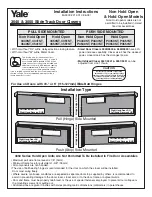
3
TS 97 FL XEA
2019-08
dormakaba Mounting instructions
Mounting
WN 059870 45532
3.2 Optional components
• Concealed cable loop for the door closer’s power
supply via the door leaf, e.g. dormakaba KÜ 480 and
LK12
• 24 V DC power supply and smoke detector panel,
e.g. dormakaba RMZ
4 Mounting
The figures in this manual’s picture section show in
part only the mounting for DIN-L. For DIN-R, the
instructions must be mirror-inverted.
4.1 Mounting variants
The TS 97 FL XEA can be mounted at the following
positions:
• on the door leaf on the hinge side
• on the door lintel on the hinge side
• on the door leaf on the opposite side to the hinge
• on the lintel on the opposite side to the hinge if
the door is not a fire/smoke protection door. This
mounting position does not conform to the CE
marking.
4.2 Mounting the door closer and slide rail
1 - 7
Carry out the mounting according to the enclosed
illustrated instructions.
4.3 Mount lever arm
8
CAUTION
Risk of injury due to unintentional loosening
of the screw connection on the lever arm
• Only use the self-locking screw supplied.
If this screw is loosened during repair or
maintenance work, the screw must be
replaced by a new self-locking original
screw.
Mount the lever arm according to the illustrated
instructions and the mounting variant.
4.4 Adjust door closer
9
Adjust the door closer power.
10
1.
Adjust the closing speed.
2.
Adjust the end stop.
4.5 Mount the cladding
11 - 13
Carry out the mounting according to the enclosed
illustrated instructions.
4.6 Set the doorstop
14
Set the doorstop according to the mounting variant
and the structural conditions. The maximum opening
angle must not be exceeded.
4.7 Function test
4.7.1 Freewheel function
1.
Apply the voltage
2.
Open the door until it stops once
‣ After the first opening, the door can be
opened and closed manually without
resistance by the door closer.
4.7.2 Close door
1.
Disconnect the voltage
‣ The door closes automatically.
5 Disassembly, recycling and
disposal
Disassembly is carried out in reverse order to the
mounting and must be carried out by qualified
personnel.
The product must be disposed of in an
environmentally friendly manner. Electrical
parts and batteries must not be disposed of
with domestic waste. Dispose of
electrotechnical parts and batteries in the designated
acceptance and collection points. Refer to the
statutory regulations for your country.






















